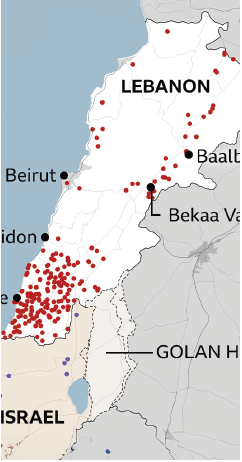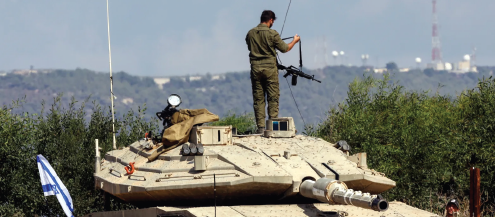As appalling as it sounds, the argument of ‘Israel’s right to self-defence’ would still continue to hold its own in the eyes of some if not all international skeptics. This can be said regardless of how controversial Israel’s relentless bombing campaign in Gaza alone has been in the eyes of majority of the international community. However, what argument could be justifiable when Gaza alone is no longer the focus and now Israel has embroiled a sovereign state like Lebanon into a regional war that warrants no international merit? I believe the answer would be ‘none’.
Although, to understand the deeper meanings behind engulfing neighboring countries into a war that ironically Israel cannot afford, it is important to look into the deeper dynamics of Israel’s internal politics by unraveling the intentions of Israel’s controversial Prime Minister Netanyahu alongside getting a glimpse into the region’s external politics and key players like Hezbollah.
Originally, the first anniversary of October 7 was meant to pay a tragic tribute to the endless tragedies witnessed by the Gazans and those in the West Bank with 1.5 million residents displaced, 80% of the infrastructure destroyed and close to 100,000 Palestinians slayed. However, it now has come to signify more. The genocide sees no end in sight. Rather It signifies the death of journalism given 300 journalists have been slain by Israeli forces with no justice served, four failed ceasefire deals which are attributed to the American veto and Netanyahu’s non-negotiable stance and more recently, the relentless bombing that once started from the fringes of South Lebanon to the destruction of its capital Beirut. With close to 3000 Lebanese slain and 1.3 million displaced, the rhetoric of Israel’s ‘right to self-defense’ once again rears its ugly head. But no longer can this destruction be justifiable.
Many Western right wing leaders on the international stage claim Israel’s actions in Lebanon are a ‘legitimate’ reaction to the retaliatory strikes of Hezbollah. The latter are forces supported as regional proxies by Iran, thus highlighting the ongoing tension between Iran and its adversary, Israel. Israel’s lackluster argument stands on returning those Israeli’s forced to evacuate the Lebanon-Israel border at the North over the threat of a Hezbollah strike and upon putting up a solid defence against Hezbollah who is a regional ally to Hamas which they claim is responsible for the capture of more than 200 Israeli hostages on October 7.
Nevertheless, the international community seemingly forgets that Israel’s reluctance to pursue a ceasefire deal suitable for all sides is not the only reason which has forced Hezbollah’s and Iran’s hand. Rather the assassination of Hamas’s leader Ismail Haniyeh on Iranian soil and the death of Hezbollah’s long-time leader Hassan Nasrullah and his successors at the hands of targeted Israeli strikes only promises more aggression in Lebanon. It serves to extend the escalation as the cries of Palestinian and Lebanese citizens, the UN and international voices of reason fall on deaf ears.
Furthermore, US President Biden applauded the assassination of Nasrullah as a ‘measure of justice served’. This not only fuels the flames of war but demonstrates the US White House’s blind support for the Israeli cause. This only serves to further embolden Netanyahu’s actions in the region rather than aim to de-escalate tensions. Biden forgets that by painting Hezbollah and Iran as ‘warmongering’ on one hand while calling for ceasefire on the other hand is not a strong recipe for regional peace. He also conveniently tends to forget that Hezbollah has repeatedly claimed that a ceasefire deal between Israel and Hamas would also signify the end of its own assault on Israeli airspace but such ultimatums have gone unrewarded and have recently even forced them to retract such statements. Let us suppose
4Biden’s argument stands but then what ‘measure of justice’ exists for the thousands of innocent civilians caught in the crossfires of war?
Instead, this boils down to Bibi (Netanyahu’s) desire to retain power and cripple all opportunities for a ceasefire even if it costs him a potential hostage deal, the support of his international allies and the confidence of his national voter base. This is because Netanyahu’s political survival hinges on prolonging the war in both Gaza and Lebanon as he is faced with ICC war crime charges and warrants on an international level and calls for new elections and protests in Israel at a domestic level. An end to the Gaza offensive would only serve to trigger official investigations into the intelligence and military failures of October 7 including the role of IDF in killing its own citizens due to sheer negligence and failiure to identify perceived ‘enemy forces’ which could implicate him directly. Additionally, Netanyahu is facing domestic corruption charges and losing power could expose him to prosecution and imprisonment.

Hence, the deliberate orchestration of Hezbollah and Hamas leaders assasination in the region purposefully derails ceasefire talks by provoking Iran and Hezbollah fighters. By keeping the war active, Netanyahu delays investigations and maintains a narrative of national defense, which helps him rally domestic and international support, particularly from allies like the US.
While Netanyahu’s actions of extending the war implies Israel entering the new phase of war and a dramatic shift away from the Israel-Hamas nexus to the Israel-Hezbollah war lens, reality proves more sinister. The invasion of Lebanon holds true, it also showcases Israel’s deceptive maneuver to shift attention away from the war in Gaza. One should not overlook the fact that the bombing campaign in Gaza has not come to an end. Rather with Lebanon in the spotlight, it forces international attention away from the Palestinian cause and desensitizes the momentum of the Palestinian solidarity movement.
Let us also not forget that Israel’s invasion of Lebanon is not the first of its kind with the last one dating back as early as 2005. The previous 36-day Israel-Lebanon war where Israel launched attacks against Hezbollah after the group captured and killed two Israeli soldiers also resulted in bloodshed. However, once again Lebanon has become an easy target given its history of civil strife and a strong Hezbollah presence.
Conclusively, Lebanon finds itself drawn into Israel’s broader war efforts, signaling a dangerous expansion of conflict. While Israel claims self-defense, its actions in Lebanon serve a darker purpose – distracting global attention from the Gaza crisis and securing PM Netanyahu’s political future. With targeted assassinations and relentless bombings, Netanyahu prolongs the war to evade accountability for his failures, risking regional destabilisation. As the world watches, the true victims – the civilians in Gaza, Lebanon, and Israel – continue to suffer, while hopes for peace and justice fade with each new escalation.
The writer is our Editorial Assistant and an international affairs analyst.



